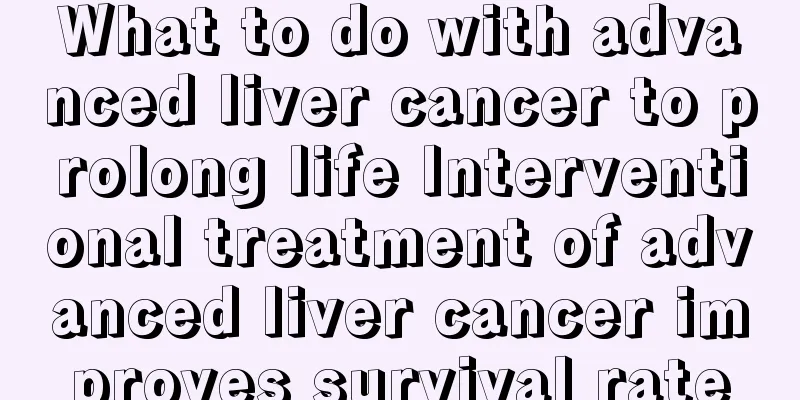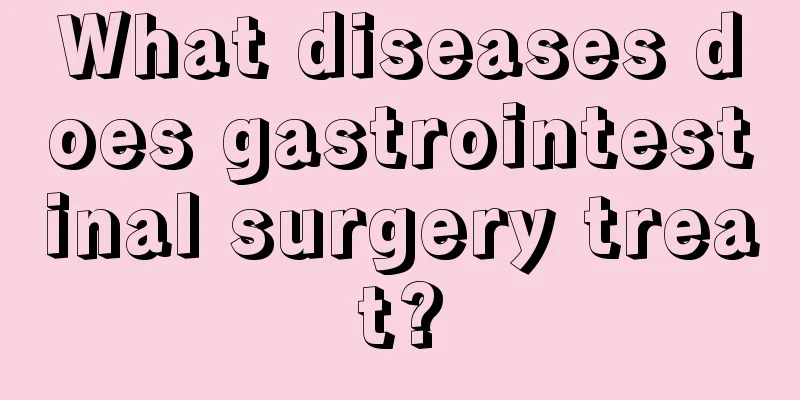What to do with advanced liver cancer to prolong life Interventional treatment of advanced liver cancer improves survival rate

|
What should I do if I have advanced liver cancer? Many patients become discouraged and unwilling to receive treatment after being diagnosed with advanced liver cancer. However, they do not know that as long as they actively receive treatment in the advanced stage of liver cancer, their survival period can be prolonged. Let's take a look at the treatment methods for advanced liver cancer. Liver cancer is one of the most common malignant tumors in my country. According to incomplete statistics, about 110,000 people die of liver cancer in my country every year, and the incidence rate is increasing year by year. It is often called the king of cancers due to its high malignancy and high mortality rate. Due to the characteristics of liver cancer, such as hidden onset, long incubation period, rapid disease progression, strong invasiveness and strong metastasis, patients generally do not feel any symptoms in the early stage. Once most people are found, they are already in the middle and late stages. Therefore, treatment is difficult and the prognosis is poor. Usually, the survival period after diagnosis is only 3 to 6 months. What to do with advanced liver cancer? Comprehensive interventional treatment can improve survival rate: 1. Liver cancer patients are often in the middle or late stages when they are discovered The main causes of liver cancer in my country are hepatitis virus infection, aflatoxin contamination of food, long-term alcoholism, and blue-green algae toxin contamination of rural drinking water. Since early diagnosis of liver cancer is crucial for effective treatment and long-term survival, early screening and early monitoring of liver cancer are emphasized. However, often, liver cancer patients are already in the middle or late stages when they are diagnosed due to the following reasons. First, the early symptoms of liver cancer are not obvious, and patients often have no symptoms in the early stages, so they are often ignored; second, many members of the public lack health care knowledge and medical common sense. Some patients do not receive formal treatment when they find early symptoms of liver cancer, but use folk remedies indiscriminately, which delays the disease; third, my country is a country with a high incidence of hepatitis, and more than 80% of liver cancers have a history of hepatitis B. Many patients have symptoms such as upper abdominal distension, abdominal pain, fatigue, and loss of appetite, and think that they are just hepatitis, but do not think they are malignant tumors. By the time they are diagnosed with liver cancer, it is often in the late stage. In the past, liver cancer was mainly treated with surgery, but when diagnosed, most patients have reached the middle and late stages, often losing the chance of surgery or having poor surgical results. Does it mean that we can only give up treatment when liver cancer is found to be in the late stages? No. With the development of treatment technology, interventional therapy, targeted drug therapy, immunotherapy, minimally invasive therapy, traditional Chinese medicine therapy, biological therapy, etc. have been used in the treatment of liver cancer. For example, interventional therapy in the field of minimally invasive treatment is a relatively good method. However, there is still a lack of long-term and effective treatment methods for liver cancer. In clinical practice, interventional therapy and drugs are generally used in combination according to the patient's condition for comprehensive treatment. 2. Comprehensive interventional therapy brings new hope to patients with advanced liver cancer Liver cancer is a tumor with a very rich blood supply. Many angiogenic factors are over-secreted. Among them, vascular endothelial growth factor and its receptor (VEGF/VEGFR) are involved in endothelial cell sprouting, migration, increased vascular permeability and tumor cell survival. They are important pathways for angiogenesis and important targets for drug development. Among the targeted drugs for the treatment of liver cancer, in addition to sorafenib, apatinib has also achieved good preliminary results in the field of liver cancer. It has a highly effective anti-angiogenic effect by highly selectively and efficiently inhibiting the activity of VEGFR2 kinase. In the Phase I clinical study, apatinib has shown significant benefits in treating various solid tumors such as liver, stomach, lung, and colorectal tumors. In the latest Phase II clinical study, 121 liver cancer patients have been included, and the results show that the efficacy of apatinib is significantly better than that of sorafenib in previous studies. This study has been selected as a key poster of ASCO in 2014. Phase III clinical studies for the treatment of liver cancer are currently underway. In addition, apatinib has economic advantages over sorafenib and is affordable to most patients in my country. Clinical studies have shown that interventional combined with targeted therapy has a good synergistic effect, high safety, and good patient tolerance. Such comprehensive treatment has achieved the effect of 1+1>2, which is worthy of further research and exploration. According to experts, the five-year survival rate of patients with early-stage liver cancer can be as high as 50% to 60% after surgery. For patients with mid- to late-stage liver cancer, the one-year survival rate can reach about 85% through comprehensive treatment, mainly interventional therapy, and the five-year survival rate can reach 20% to 30%. Some patients have been treated for more than ten years and are still in good health. Through interventional targeted combined treatment, the continued development and metastasis and recurrence of tumors are effectively blocked, making it possible to survive with tumors. Although the current treatment methods for malignant tumors cannot achieve complete cure, cancer is no longer an incurable disease, and survival with tumors can also pursue a good quality of life, and cancer will become a chronic disease. 3. Three Dos and Three Don’ts to Prevent Liver Cancer Faced with such a high incidence of diseases, we should take preventive measures. First of all, we should regularly vaccinate against hepatitis B. Children must be vaccinated from an early age, which blocks a major path to liver cancer. Secondly, we should develop healthy eating habits. Finally, we should have regular physical examinations, especially for hepatitis B patients, to prevent the occurrence and development of liver cirrhosis. At the same time, the primary prevention policy for liver cancer formulated by the state also points out: do not drink ditch and pond water, drink deep well water and tap water, avoid water pollution; do not eat moldy food, stay away from the carcinogen aflatoxin; reduce alcohol intake to avoid alcohol damage to liver health. |
>>: What is the cause of liver cancer? 6 ways to quickly help you prevent liver cancer
Recommend
What to do if leather clothes are moldy
Leather jackets are very common clothing. Such cl...
Several aspects that should be paid attention to when dealing with chin acne
Most patients with acne on the chin are women, an...
Is urea nitrogen the same as urea
Urea is actually a kind of fertilizer widely used...
An old Chinese doctor teaches you how to diagnose patients face to face?
Facial diagnosis is a method of determining the p...
What are the medicinal values of flying squirrels
Flying squirrel can also be called flying squirre...
What is ear candleping?
Today's medical technology is very advanced, ...
What are the ways to prevent prostate cancer? Introduction to ways for men to prevent prostate cancer
The incidence of prostate cancer in elderly men i...
How long can a patient with liver metastasis of gallbladder cancer live after surgery
Gallbladder cancer is one of the common malignant...
Symptoms of stomach heat and bad breath
When some people have stomach problems, they will...
Why do I feel dizzy when my head shakes?
If you feel dizzy when your head shakes, you must...
What is dental sealing medicine
When people have toothache, they will want to tak...
Which physical problems indicate symptoms of lung cancer? To prevent lung cancer, you should pay attention to these three signs
There are many causes of lung cancer, including h...
Arthroscopic treatment of meniscus
Many people choose arthroscopy as a treatment met...
Does lung cancer affect the fetus?
In fact, this is a concern of many young patients...
Are sunflower seeds nuts?
Many of our friends in life love to eat snacks, b...









